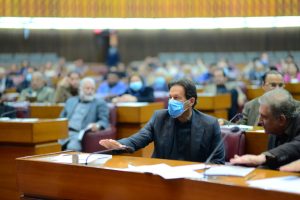The Pakistan Democratic Movement (PDM) announced a march on March 23, Pakistan Day, to protest against the government’s economic failures. The opposition alliance has said that the protest will mark the start of its campaign to oust the Pakistan Tehreek-e-Insaf (PTI) government led by Prime Minister Imran Khan.
While the PTI government faces pressures on many fronts, it is unlikely that the PDM’s upcoming mass protest will force it out of office. Rather, the party’s internal fissures may seal its fate. Internal divisions within PTI and conflicts among its rank and file pose a bigger threat than the challenged from the PDM.
The PTI is now an organization whose party structure is on the verge of collapse. Its leaders and workers appear to be doing a much better job at disparaging the party than the opposition.
During a parliamentary party meeting last week, Defense Minister Pervez Khattak is reported to have reminded Khan that legislators were accountable to the voters. “It is us who got you elected as prime minister,” Khattak said. In response, Khan reportedly told him that if he continued to blackmail him in front of everybody, he “would invite the opposition to come and rule the country.”
Earlier this week, PTI leader Noor Alam criticized his government in the National Assembly for allegedly ignoring Khyber Pakhtunkhwa and called for placing key cabinet members, including the Prime Minister, on the Exit Control List.
Several other leaders and allies of the PTI appear to be taking on the Prime Minister covertly and overtly.
One reason for growing dissatisfaction within the PTI’s ranks is the party’s dismal governance. This is making it difficult for party lawmakers to face their voters. It has weakened their position vis-à-vis their rivals in their electoral constituency.
As the country moves toward the next general election, PTI legislators are worried about their own chances of being voted back to parliament. If PTI politicians saw the party as their ticket to power in the 2018 general election, they now see it as a liability to be dropped ahead of the 2023 elections to parliament. For some politicians, criticizing their own party could perhaps improve their electoral prospects than staying loyal to it.
A large number of politicians in the PTI’s ranks are those who do not have ideological links with any political party. They are known as political professionals who always choose the winning side and have sufficient contacts in the institutions that decide the fate of elections in Pakistan to figure out which party will lose.
For these politicians, the time to make decisions for the next general election has arrived. They sense the winds of change which are blowing against the PTI.
The PTI’s recent loss in local bodies elections in its stronghold, Khyber Pakhtunkhwa, party workers’ resentment over the dissolution of the party’s organizational structure last month and the Election Commission of Pakistan (ECP)’s scrutiny of the ruling party in the foreign funding case are forcing many legislators into looking for new prospects as far as the next general election is concerned.
Above all, the perception that Pakistan’s security establishment is not supporting the ruling party or intervening on its behalf to minimize its political challenges is also having an impact.
One can argue that the PDM is not interested in making a credible push to oust the current government at this point. It is mere rhetoric to stay in the game and keep their workers busy and mobilized. Apparently, their calculations are focused on making gains from the people’s growing resentment towards the ruling party.
If the PTI’s internal divisions continue to expand with some of its lawmakers striking deals with opposition parties to secure tickets for the next general election or to evade their vendetta when they come to power, the ruling party’s political maneuverability in the coming months and its preparations for the incoming election will be hampered.

































